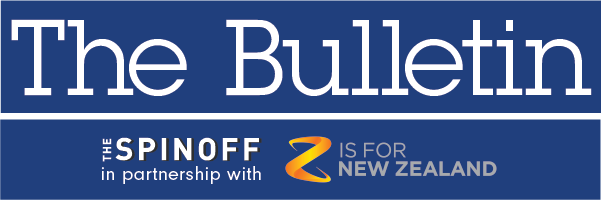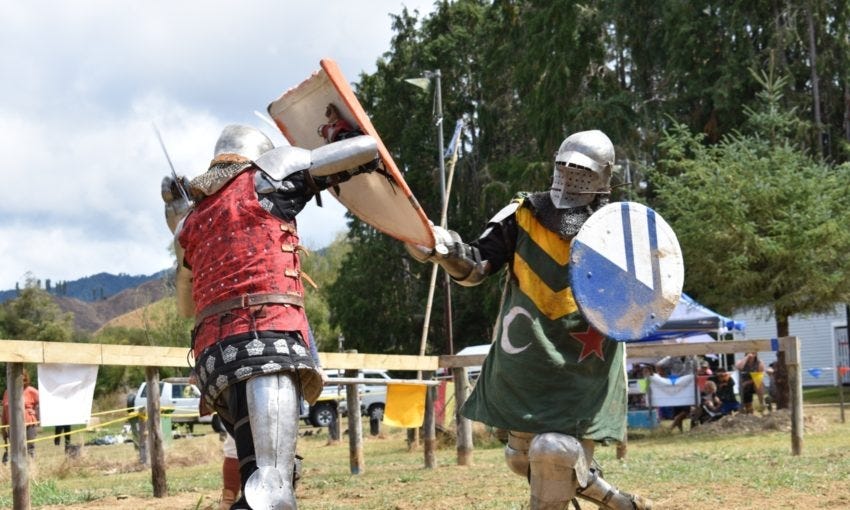When are we getting out of lockdown?
Short answer – when it's safe. The longer answer is that it could be quite a while

Good morning and welcome to The Bulletin for Monday 30 March, by Alex Braae for The Spinoff. Presented in partnership with Z Energy.
In today’s edition: Conditions for leaving lockdown explored, nation’s first death from Covid-19 reported, and Australian govt continues to discriminate against NZers.

Image: Police officers patrolling the locked down streets of Christchurch (Getty Images, Sanka Vidanagama)
When will the Covid-19 lockdown across New Zealand end? Short answer – when it's actually safe to do so. Officially, the current state of level four restrictions will be in place for four weeks. But it's worth going into a bit more depth about how and why that could end up being longer.
Longer restrictions are already being talked about, with this Newshub piece being an example of that. It reported comments from PM Ardern which noted that the mechanisms in place could easily be extended. There could be regional lockdowns that continue, while other places may be able to open up again. It also noted that border restrictions are extremely unlikely to be lifted any time soon, given the virus appears to have spiralled out of control in many other countries, and it would simply be too dangerous to reopen before there's a vaccine. In Britain, one such country with a horrific and rapid rise in deaths, there are now government suggestions that the lockdown will be in place until June at least, reports the Mirror.
The key point for New Zealand's domestic lockdowns will therefore be community transmission, and whether it has been stopped, according to this analysis from Stuff's Henry Cooke. If it proves to actually be possible to eradicate Covid-19 from the country – and there is a chance of that happening – then we could see domestic life come close to returning to normal. According to the University of Otago's Dr Michael Baker, who was quoted in the story, to be sure that was the case we'd basically need to be testing everyone with a fever to ensure that silent spread hadn't been missed.
It won't be until at least next week that we have a clearer picture of whether the lockdown is likely to be extended. That comes from an interview health minister David Clark gave Q+A, in which he said that it would be about 10 days from the start of the lockdown before there was likely to be any bending of the curve on case rates, and for restrictions to be lifted would require a "significant" bend. He stressed that "we haven't got into specific numbers," and that tracking of cases would be crucial. But he also said that "it's in our hands" to end the lockdown on time, provided everyone does their part.
Meanwhile those breaking the lockdown rules are being told that they're risking it being extended for everyone. And after being inundated with calls about people breaking those rules, the police have now set up an online system by which people can be dobbed in. There are very few situations where I'd encourage citizens to nark on each other for non-violent stuff, but this is certainly one of them, so if you know people are actively flouting the rules, report them.

Just quickly, a message from a reader:
“I love that The Spinoff has a variety of voices who investigate issues I care about. I joined The Spinoff Members to support stories that might not otherwise get told.” Michael Gray, Spinoff Member.
Support our work. Join The Spinoff Members.
New Zealand's first death relating to Covid-19 has been recorded. It was a woman in her 70s, on the West Coast, who was initially admitted to hospital for what was thought to be influenza, complicated by underlying health conditions. PM Ardern said it "brings home exactly why we are taking such strong measures to stop the spread of this virus. Left unchecked, it runs the risk of taking the lives of many more people.” 21 staff at the hospital are now in self-isolation, after treating the woman with PPE suitable for influenza, rather than for Covid-19.
Further updates on current case numbers can be found in yesterday's live updates page, but in brief: The total number is now 514, and there are seven 'significant clusters' of cases around the country. Nine patients are currently in hospital, and an average of almost 1800 tests a day were processed over the last week. 56 patients have now recovered from their symptoms.
The Australian government is continuing to discriminate against New Zealand citizens who find themselves unemployed, reports Radio NZ. The 650,000 NZers in Australia are barred from receiving a benefit, which has always been the case, but with mass unemployment about to hit the country has been thrown into the spotlight. A few people who are now in this position spoke to RNZ about their situation, with two laid off workers noting that up until they were made redundant (through no fault of their own) they had been hard-working taxpayers.
New Zealanders overseas continue to struggle to make it home, with options and transit routes dwindling. One News reported on the dozens of NZers still in Peru, many of which had been booked on a charter flight, but were then unable to connect through Sydney to get here. It goes both ways – there are some people from other countries stuck in New Zealand too. Politik this morning has reported on a plea for reciprocity from the British government, who have thousands of citizens currently stranded here.
Workers at one New World supermarket were told they won't be paid if they find themselves unable to work over the lockdown period, reported Stuff on Saturday. It quickly looked like spiralling into something of a PR disaster for the franchise over the weekend. However, on Sunday One News reported that policy would change, and that all vulnerable workers who had to self-isolate would continue to be paid. The Foodstuffs group (which includes New World, Pak'n'Save and Four Square) will also pay frontline staff a 10% bonus over the level four lockdown period – which could still result in some staff earning less than the living wage. Supermarkets are currently in a strong position financially, with a dramatic increase in their control over the consumer food supply market. Meanwhile, petitions have been launched calling for essential workers in a range of industries to be given 'danger pay' over this period.
The Corrections minister says there are no plans to release low-level offenders to reduce double-bunking. Kelvin Davis told The Hui that at present, the system is not over capacity, and there have been no positive tests for Covid-19 within the system. However, there has been a lot of concern about this issue internationally, with prisons (particularly double-bunked prisons) being seen as a dangerous potential source of virus spread.
Many community papers will not be publishing over the lockdown period, reports Duncan Greive for The Spinoff. It'll be a big concern for many communities, in part because many of the readers served by those titles aren't necessarily getting local news from anywhere else, and partly because it could be a major hit to the viability of the publications. The PM addressed this at her press conference yesterday, saying the issue was one of distribution safety. "We need to protect the safety of the workforce, and the old forms of distribution just would not work." She also said that minister Kris Faafoi would be in contact with publishers to discuss the issue. For more on the cataclysm Covid-19 is for the media, I highly recommend listening to Duncan Greive talk to himself about it for half an hour on The Fold – that's not a joke either, it's actually gripping listening for anyone concerned for the industry.
Got some feedback about The Bulletin, or anything in the news?
Drop us a line at thebulletin@thespinoff.co.nz

Right now on The Spinoff: This section will be very extended today, because we published a lot of stuff worth reading over the weekend. I'll try and break it up a bit.
In business and associated news: Michael Andrew reports on the massive surge in internet use being picked up over the last week. Michael Andrew (again) reports on scams being run at the moment trying to cash in on Covid. Catherine Woulfe writes about how the books community is still trying to reach readers amid the lockdown. Michael Andrew (again) has updated his article on who is entitled to what under the wage subsidy scheme. And the Business is Boring podcast spoke to Dr Michelle Dickenson (aka Nanogirl) who has built a pandemic-ready online learning platform.
In health-related news: Rachel Thomas profiles Dr Ashley Bloomfield, the face of the Covid-19 response, who over the weekend finally had a day off. Alice Webb-Liddall reports on why risk-taking behaviour from individuals is so dangerous for the country as a whole at the moment. Leonie Hayden reports on the latest official advice about PPE – personal protective equipment. Alex Casey talks to the SPCA to get some advice about how to handle pets during the lockdown.
For some good pieces of writing about this whole thing: We've got two more Lockdown Letters to share – Ōtaki author Renée writes about (among other things) her annoyance at constantly hearing the term 'the elderly', and Morgan Godfery writes about struggling with concentration and sleep. Danyl Mclauchlan writes about the fear of viruses and his understanding of them from culture, and how in real life they're very unlikely to be 'cosy catastrophes'. Historian Ayelet Zoran-Rosen writes about the changing ways societies and governments have reacted to pandemics in the past.
On the telly: Sam Brooks and Tara Ward put their heads together for some of the best binge-watches on Neon. Sam Brooks also reviews the new Netflix show Tiger King, which is getting a lot of (not necessarily positive) attention online. And Simon Day and Calum Henderson write about the iconic cricket matches being re-broadcast by Sky at the moment.
And finally, a piece by me. About a month ago, I went to a tiny place called Ohura for a medieval market day, and came back with a feature about a niche sporting community, and the struggle for forgotten places to pick themselves back up after being economically and socially hammered down. Even though the piece now almost feels like an artefact from a different world, I'd very much appreciate you giving it a read – after all, I may not get the chance to write another like it for quite some time.
That's it for The Bulletin. If you want to support the work we do at The Spinoff, please check out our membership programme.




